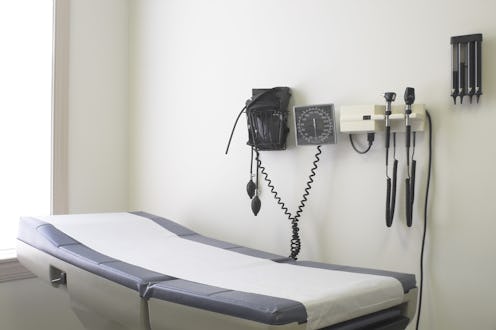Life
A New Study Says Lesbian & Bisexual Women May Be More At Risk For Diabetes — Here’s Why

It's no secret that being a member of the LGBTQ community can be stressful. Even though representation has made huge inroads, it can still be dangerous in certain spaces to present as LGTBQ, and even if one's safety isn't being directly threatened, microaggressions and other instances of daily othering take a toll on one's mental health — for many different communities that experience marginalization. And a new study has found that this stress might even be directly linked to illness, especially for lesbian and bisexual women; it found that stress of this kind may lead to an increased risk of type 2 diabetes.
A number of studies have been done on stress in LGBTQ communities, and extensive evidence has been found to show that societal pressure targets queer folks in unique and harmful ways. Queer people who are multiply marginalized — specifically, who belong to the LGBTQ community and who are also people of color — are particularly prone to experiencing a lot of stressors, according to one study done in 2011, and there simply aren't resources to address these stressors. And research by the Trevor Project, a non-profit that focuses on mental health in LGBTQ young people, in 2017 found that stress levels in queer teens and young adults have spiked during the Trump administration, as the administration works to roll back protections for the LGBTQ community. Stress and its related illnesses, for LGBTQ people, are nothing new — but the specific link to diabetes made by this recent study is a first.
The 24-year study looked at 94,250 women in the U.S., of whom 1,267 identified as lesbian or bisexual and 92,983 said they were heterosexual. All were between 24 and 44. Starting in 1989, the study examined health outcomes in the cohort of women, and found something surprising: the lesbian and bisexual women were 27 percent more likely to develop type 2 diabetes than the straight ones. The women who identified as lesbian or bisexual were also more likely to develop diabetes younger than the women who identified as straight.
Diabetes is an autoimmune condition that affects the body's relationship to insulin, a hormone that helps regulate your glucose levels. For people with type 1 diabetes, which is often called 'juvenile' diabetes because the age of onset is fairly young the body doesn't produce insulin, according to the U.S. National Library of Medicine. For people with type 2 diabetes, which is acquired with age, the body doesn't manage its insulin levels well, leading to blood sugar spikes and crashes that impact one's energy levels.
The study couldn't identify precisely why stress in lesbian and bisexual women lead to type 2 diabetes, but the scientists behind it have a pretty good idea. The risk of developing type 2 diabetes spikes in people who are obese, who smoke, and who consume a lot of alcohol, the risk of which also spikes as people experience more stress in their lives. We know from previous research that people in the queer community tend to drink more than straight people do, again as a result of stress. They also smoke more, and lesbian and bisexual women are more likely to be overweight or obese compared to heterosexual women, according to the Office Of Disease Prevention. These are all outcomes related to every day stress, but doesn't take into account possible trauma-related stressors that the LGBTQ community may be more likely to come in contact with.
All of this adds up, with potentially dangerous consequences. And the end result, for lesbian and bisexual women, appears to be a heightened risk of a health problem that deserves attention.